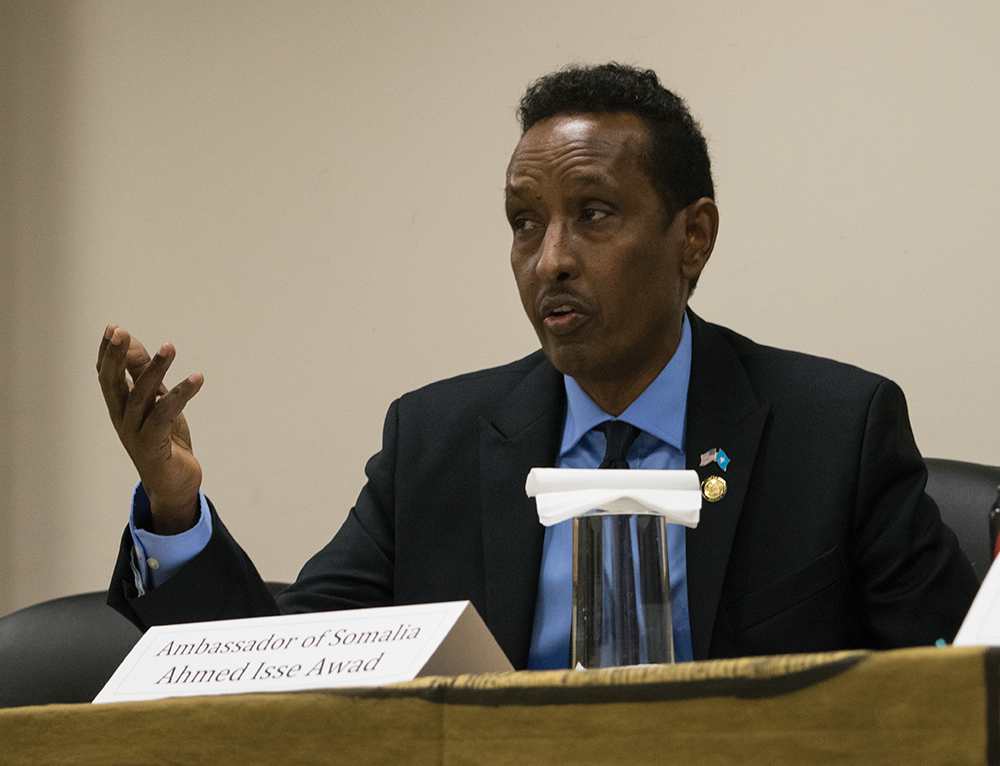
Somali Ambassador to the United States Ahmed Isse Awad discussed U.S.-Somali relations Tuesday in the Intercultural Center.
Recently appointed Somali Ambassador to the United States Ahmed Isse Awad and Deputy Assistant Secretary of State in the Bureau of African Affairs Shannon Smith emphasized the improved U.S.-Somali relationship and discussed strategies to defeat the terrorist group Al-Shabaab at an event in the Intercultural Center on Tuesday.
Director of the African Studies Program Scott Taylor moderated the event, which was the first event of the Institute for the Study of Diplomacy’s series on African ambassadors.
Smith spoke about the history of the U.S.-Somali relationship and future plans for the strategic partnership. The United States stopped recognizing Somalia’s government in 1991, following a civil war in the country.
Smith said the 1993 battle for Mogadishu — Somalia’s capital — in which 18 American soldiers were killed in efforts to stabilize the country, served as a turning point in U.S.-Somali relations.
“It’s hard to overestimate the importance of this moment [in U.S.-Somali relations],” Smith said. “It became seared into the memories of a generation of policymakers and legislators. … It is the moment of Somalia that they most remember.”
Since the battle, Smith said U.S.-Somali relations have moved in a positive direction in the last decade.
“It is incumbent on us to understand that it is the past and we must look forward to the future,” Smith said.
Smith and Awad also spoke about the 2012 Somali election. Following the elections, in 2013, the United States recognized Somalia as a country for the first time in 22 years. In early November, the Somali embassy reopened in Washington, D.C., and the State Department hopes to soon reopen its own embassy in Somalia.
Awad further discussed what he feels are the two narratives of Somalia. While Awad believes that the predominant global narrative is one of war and chaos, he said that the crisis-stricken image of Somalia does not truly reflect the country.
“75 percent of the narrative is the resilience of the Somali people,” Awad said. “Somali people have not only survived the devastating civil war but have actually thrived and prospered.”
Awad said the emergence of major cities in Somalia is proof of its evolution and modernization.
“After Somalia collapsed in 1991, everything was in Mogadishu. You want to go to university, you go to Mogadishu. You want to go to the hospital, you go to Mogadishu. … Today, Somalia has more than two dozen major centers where there are airports … [and] universities,” Awad said.
Praising the spirit of entrepreneurship throughout the country, Awad also said Somalia carries a reputation of economic success.
Taylor concluded the event by asking Smith how U.S. policymakers could best stop Al-Shabaab.
Smith said that a global approach to tackling Al-Shabaab would be tantamount in the group’s elimination.
“It will take the sustained commitment of the international community. … It’s not just Somalia’s problem; it’s the region’s, it’s the world’s,” Smith said.
Awad also offered specific solutions.
“You have to defeat them militarily, you have to defeat them ideologically … and they have to be defeated economically,” Awad said.
Preetham Chippada (SFS ’19) said that the discussion about Al-Shabaab was particularly relevant to forging a path to stronger U.S.-Somali relations.
“I liked the discussion about Al-Shabaab, especially about how the youth were susceptible and how the youth need to be empowered, because I think that’s a very relevant discussion to building a stronger country and building stronger relations with the United States,” Chippada said.




















